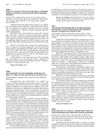 7 citations,
January 1994 in “Annual Reports in Medicinal Chemistry”
7 citations,
January 1994 in “Annual Reports in Medicinal Chemistry” Understanding how androgens work is key for creating new treatments for prostate issues and hair/skin conditions.
 3 citations,
November 2020 in “Curēus”
3 citations,
November 2020 in “Curēus” A child's hair loss from alopecia areata was fully reversed in five months using diet and supplements.
 49 citations,
January 1994 in “The Journal of Steroid Biochemistry and Molecular Biology”
49 citations,
January 1994 in “The Journal of Steroid Biochemistry and Molecular Biology” RU 58841 may treat acne, hair loss, and excessive hair growth.
 20 citations,
March 2005 in “Current Medicinal Chemistry”
20 citations,
March 2005 in “Current Medicinal Chemistry” New compounds show promise for treating hair loss, enlarged prostate, and prostate cancer, with some being more effective and having different side effects than current treatments.
 13 citations,
December 2012 in “Frontiers in bioscience”
13 citations,
December 2012 in “Frontiers in bioscience” Vitamin D and estrogen may help protect heart and kidney health, and maintaining sufficient vitamin D levels could be especially beneficial for African Americans, postmenopausal women, and people with chronic kidney disease.
 80 citations,
August 2002 in “Journal of Dermatology”
80 citations,
August 2002 in “Journal of Dermatology” Best hair growth results from combining finasteride and minoxidil.
 31 citations,
October 2002 in “Dermatologic Surgery”
31 citations,
October 2002 in “Dermatologic Surgery” Minoxidil helps stabilize hair loss, increase density, and reduce shedding after hair transplant surgery.
 January 2019 in “ISGE series”
January 2019 in “ISGE series” The document concludes that effectively managing PCOS requires a multifaceted approach.
 123 citations,
December 2015 in “Journal of Neuroendocrinology”
123 citations,
December 2015 in “Journal of Neuroendocrinology” New targets for making and using brain-synthesized steroids could lead to better treatments for brain disorders and alcoholism.
 22 citations,
January 2014 in “Indian Journal of Endocrinology and Metabolism”
22 citations,
January 2014 in “Indian Journal of Endocrinology and Metabolism” Family members of North Indian women with PCOS have a high rate of metabolic syndrome.
8 citations,
December 2022 in “International journal of molecular sciences” Mice without the enzyme HSD17B3 still produce normal testosterone, suggesting they have different ways to make it compared to humans.
 38 citations,
October 2006 in “Fertility and Sterility”
38 citations,
October 2006 in “Fertility and Sterility” The document concludes that identifying the cause of amenorrhea is crucial for proper treatment.
 30 citations,
July 2004 in “Fertility and Sterility”
30 citations,
July 2004 in “Fertility and Sterility” Amenorrhea is when a woman doesn't have periods, with primary amenorrhea starting by age 15 or within five years of breast development, and secondary amenorrhea when periods stop for three months. It affects 3-4% of women not pregnant, breastfeeding, or in menopause, mainly due to polycystic ovary syndrome, hypothalamic amenorrhea, hyperprolactinemia, and ovarian failure.
 August 2001 in “Veterinary Dermatology”
August 2001 in “Veterinary Dermatology” The meeting presented findings on effective treatments for various pet skin conditions and insights into the immune responses of dogs with atopic dermatitis.

Herbal remedies might help with hair loss but need more research for safety and effectiveness.
 59 citations,
August 2004 in “Human Reproduction Update”
59 citations,
August 2004 in “Human Reproduction Update” Testosterone replacement can help women with low libido and mood, but they need to have enough estrogen first to avoid side effects.
November 2022 in “Annals of Translational Medicine” Immune activities and specific genes are important in male pattern baldness.
October 2021 in “Case Reports in Veterinary Medicine” The dog died from myxedema coma linked to severe atherosclerosis and thyroid issues.
 2 citations,
July 2022 in “Cell Regeneration”
2 citations,
July 2022 in “Cell Regeneration” Understanding hair growth involves complex factors, and more research is needed to improve treatments for hair loss conditions.
 January 2025 in “Frontiers in Pediatrics”
January 2025 in “Frontiers in Pediatrics” Baricitinib significantly improved hair regrowth and skin condition in a 14-year-old with alopecia areata and atopic dermatitis.
 42 citations,
July 2012 in “PLOS ONE”
42 citations,
July 2012 in “PLOS ONE” Estrogen can temporarily slow down hair growth but this can be reversed.
September 2024 in “Frontiers in Neuroendocrinology” 5-alpha reductase inhibitors may help protect the brain and gut in Parkinson's disease.

Teprotumumab for thyroid eye disease commonly causes fatigue, brittle nails, dry eyes, hair loss, muscle spasms, and dry mouth, with rare serious events like blood clots.
 16 citations,
January 2007 in “Journal of Obstetrics and Gynaecology”
16 citations,
January 2007 in “Journal of Obstetrics and Gynaecology” The document suggests various treatments for PCOS, including medication for menstrual issues, insulin resistance, and excess hair, as well as fertility treatments, while highlighting the need for personalized care and lifestyle changes.
 39 citations,
November 2015 in “Nanomedicine”
39 citations,
November 2015 in “Nanomedicine” Improved Finasteride delivery for hair loss treatment.
 35 citations,
January 2014 in “Postepy Dermatologii I Alergologii”
35 citations,
January 2014 in “Postepy Dermatologii I Alergologii” DHT's role in hair loss is important, but measuring its level for diagnosis is questionable.
 16 citations,
August 2011 in “Annals of Allergy Asthma & Immunology”
16 citations,
August 2011 in “Annals of Allergy Asthma & Immunology” A woman with severe angioedema improved significantly after treatment with rituximab.
 April 2012 in “The Journal of Urology”
April 2012 in “The Journal of Urology” PSA screening's effectiveness in reducing prostate cancer deaths can vary based on trial design and participant compliance.
 April 2012 in “The Journal of Urology”
April 2012 in “The Journal of Urology” More prostate biopsies increase the chance of finding cancers that may not need treatment.
 152 citations,
October 2010 in “Archives of Dermatology”
152 citations,
October 2010 in “Archives of Dermatology” Finasteride helps hair growth but may cause sexual side effects.


























